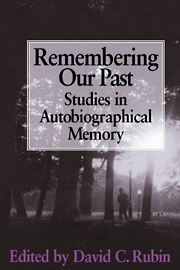Book contents
- Frontmatter
- Contents
- List of contributors
- 1 Introduction
- Part I Approaches
- Part II Accuracy
- 5 Time in autobiographical memory
- 6 The pliability of autobiographical memory: Misinformation and the false memory problem
- 7 Autobiographical memory in court
- Part III Emotions
- Part IV Social functions
- Part V Development and disruption
- Subject index
- Author index
7 - Autobiographical memory in court
Published online by Cambridge University Press: 14 October 2009
- Frontmatter
- Contents
- List of contributors
- 1 Introduction
- Part I Approaches
- Part II Accuracy
- 5 Time in autobiographical memory
- 6 The pliability of autobiographical memory: Misinformation and the false memory problem
- 7 Autobiographical memory in court
- Part III Emotions
- Part IV Social functions
- Part V Development and disruption
- Subject index
- Author index
Summary
Without falling into the trap of portraying autobiographical memory as a wholly inadequate device, we can safely say that it is not precise. Every chapter in this book can be used as a reference to support this statement. The fact is so obvious that no legal system in the world is based upon an absolute trust in witness memory. An exception is the absolute trust in the memory of a police officer, enshrined in Dutch criminal law. For other witnesses the relevant question is not whether their memories are precise, but whether they are sufficiently precise to answer the questions asked in the courtroom. These questions can be detailed, like the exact times at which things happened; the exact wording of a statement made a long time ago; the voice of a person met only once; the face of a person seen driving a car at high speed in the middle of the night. To psychologists such questions may seem stupid, because obviously they cannot be answered with complete precision. To the lawyer, however, it is obvious that without answers to such questions there can be no criminal justice, and hence no safety in our society. There is no alternative to getting the best possible answers from witnesses, even though it is realized that these answers can be wrong.
- Type
- Chapter
- Information
- Remembering our PastStudies in Autobiographical Memory, pp. 180 - 196Publisher: Cambridge University PressPrint publication year: 1996
- 4
- Cited by

